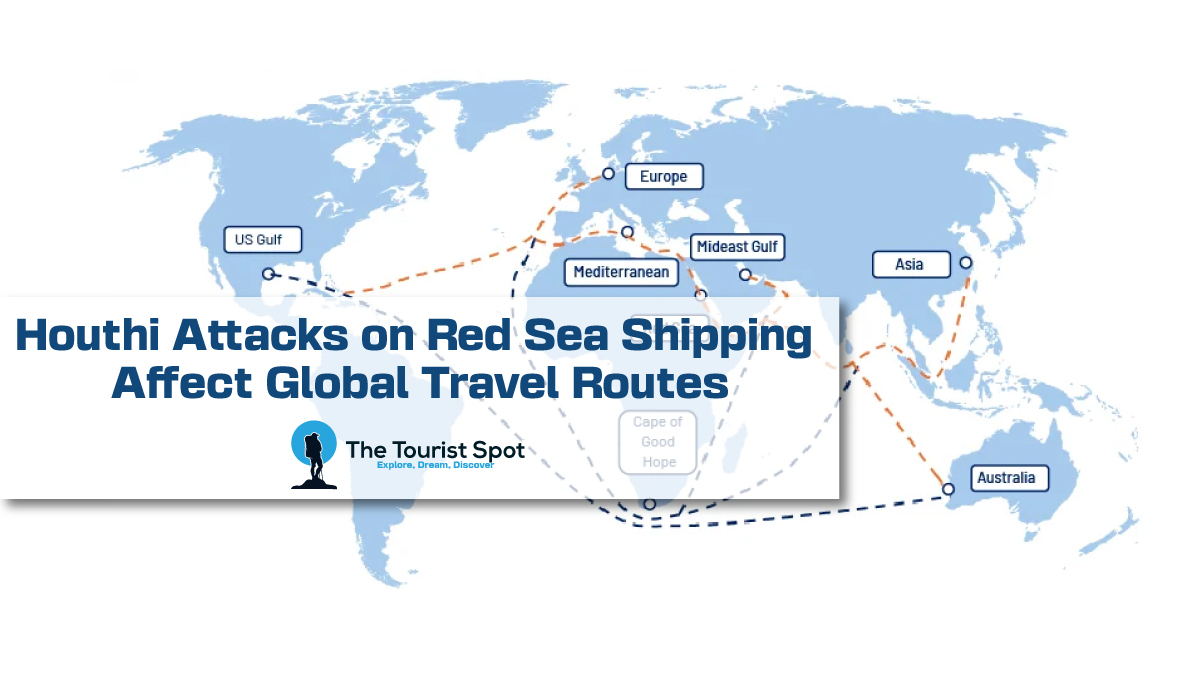In 2025, the Houthi attacks on Red Sea shipping have triggered widespread disruptions across international travel and global logistics. What began as a regional maritime conflict is now impacting the global economy and forcing airlines, cruise operators, and shipping companies to reroute or suspend services.
As tensions rise in the Red Sea, one of the world’s most critical maritime corridors, travelers and industry stakeholders are seeking clarity on how these developments will shape mobility and commerce in the months ahead.
Understanding the Red Sea’s Strategic Importance
The Red Sea is a major artery in the global trade network. Stretching between the Suez Canal in the north and the Gulf of Aden in the south, it connects the Mediterranean with the Indian Ocean. Every year, a significant portion of the world’s oil, goods, and commercial vessels pass through this narrow channel.
Any disruption—such as the recent Houthi attacks on Red Sea shipping—can lead to global consequences, from fuel price hikes to delays in product deliveries and rerouted travel paths for commercial vessels and flights.
Timeline of the Escalation
The Houthi rebel group, based in Yemen, has intensified its operations in the Red Sea since early 2025. Armed with advanced missile systems and naval drones, they have targeted commercial cargo ships, oil tankers, and even foreign naval patrols.
These attacks have caused major shipping lines to temporarily halt Red Sea operations, with vessels being rerouted around the Cape of Good Hope—a journey that adds weeks and significant costs to each trip.
Immediate Travel Disruptions
The escalation has caused ripple effects across the travel industry:
- Cruise lines with itineraries passing through the Red Sea have canceled or rebooked sailings.
- Airlines flying over or near Yemeni airspace have altered flight paths, increasing travel time.
- Ports in the region are operating under high alert, and cargo inspections have become more intense.
- Travel insurance providers are now excluding coverage for Red Sea travel routes or charging higher premiums.
These changes have created uncertainty for travelers planning to visit countries along the Red Sea coast, including Egypt, Sudan, Saudi Arabia, and Djibouti.
Impact on Air Travel
Although airspace over the Red Sea is still operational, heightened military activity and safety alerts have prompted many international airlines to reroute long-haul flights. Flights between Europe, Asia, and Africa now experience longer durations and possible layover complications.
Some low-cost carriers have canceled services entirely to destinations near the conflict zone, creating booking challenges for both tourists and business travelers.
Cruise and Maritime Tourism: A Setback
Cruise operators offering Red Sea and Suez Canal experiences have temporarily paused operations. Popular port cities like Hurghada (Egypt), Jeddah (Saudi Arabia), and Aqaba (Jordan) are witnessing a drop in tourism arrivals. This has deeply affected local economies that rely heavily on seasonal tourism.
The Houthi attacks on Red Sea shipping not only endanger vessels but also disrupt port schedules, customs processing, and onboard safety measures.
Global Shipping and Economic Fallout
The shipping industry is bearing the brunt of the crisis. Container ships are now forced to take longer and more expensive detours. This has delayed everything from electronics to food supplies, impacting global supply chains and causing price fluctuations.
Increased fuel consumption from longer journeys is also contributing to rising logistics costs, which may soon be reflected in consumer prices worldwide.
Travel Advisory and Safety Recommendations
Governments across the world have updated their travel advisories to reflect the deteriorating situation in the Red Sea. Travelers are advised to:
- Avoid cruise routes through the Red Sea until stability returns.
- Monitor airline route changes and prepare for delays.
- Use travel agencies that provide real-time updates and contingency options.
- Purchase travel insurance that covers political risk and maritime disruption.
Political and Military Response
To protect commercial interests and ensure maritime freedom, several countries have deployed naval forces to the Red Sea. However, the Houthi forces remain unpredictable, and analysts warn of the possibility of a prolonged conflict.
The international community is urging diplomatic resolutions, but progress is slow due to complex geopolitical dynamics involving regional powerhouses.
What This Means for Future Travel
The Houthi attacks on Red Sea shipping could permanently reshape global travel patterns. If the conflict continues, travelers and companies may shift to alternative routes or destinations. Countries dependent on Red Sea tourism may need to invest in new security infrastructure and marketing strategies to restore confidence.
For now, flexibility and caution are key for anyone planning travel through or near the affected areas.
Conclusion
The Houthi attacks on Red Sea shipping are more than a regional security issue—they are a pressing global concern. Whether you’re a traveler, a logistics provider, or simply following global affairs, it’s clear that the Red Sea is a flashpoint to watch in 2025.
Stay updated with the latest travel advisories, plan smart, and be prepared for ongoing changes as the situation evolves.

